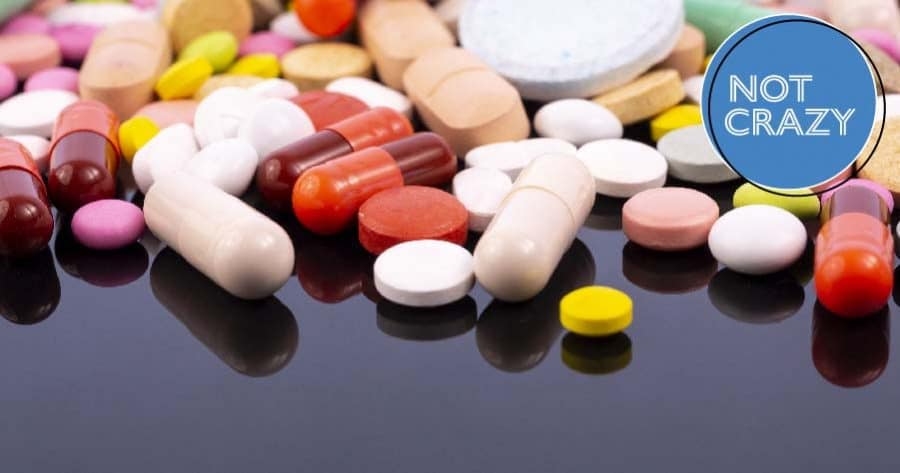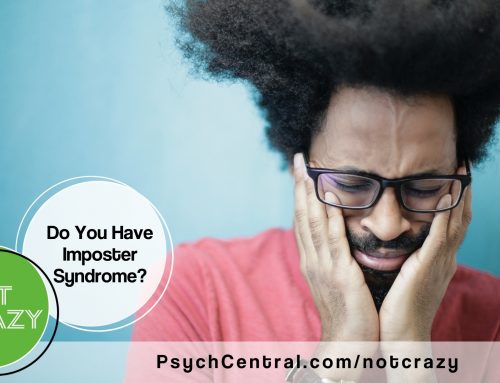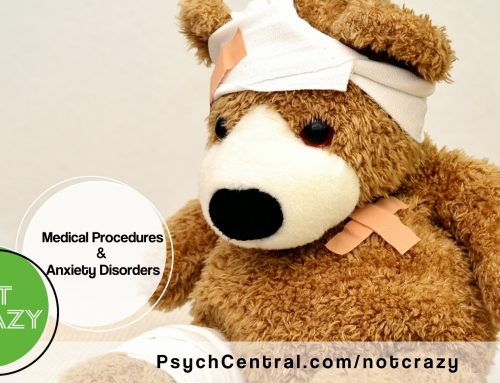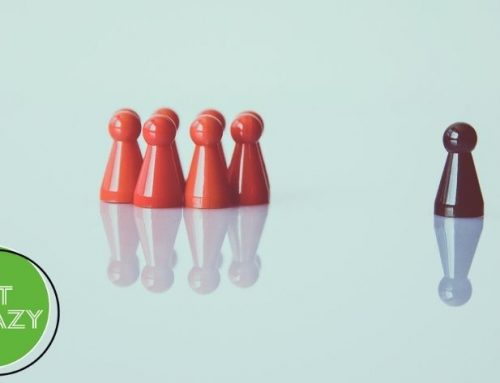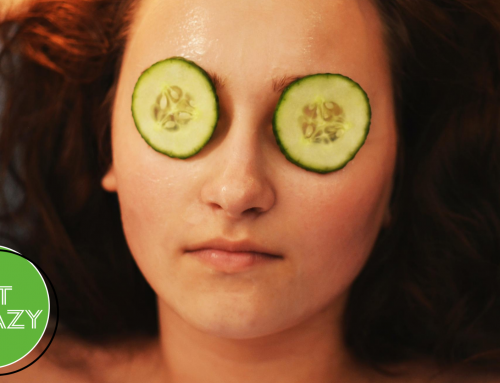Psychiatric medications are the religion and politics of the mental health advocacy world — don’t bring them up unless you want a fight to break out. Luckily, here at Not Crazy, we don’t shy away from confrontation.
In this episode, we cover the good, the bad, and the ugly surrounding medications. Like whether or not you should take them. We tackle side effects like feeling numb and sexual dysfunction and share our personal histories with medication therapy. Listen now!
SUBSCRIBE & REVIEW
About The Not Crazy Podcast Hosts

Gabe Howard is an award-winning writer and speaker who lives with bipolar disorder. He is the author of the popular book, Mental Illness is an Asshole and other Observations, available from Amazon; signed copies are also available directly from Gabe Howard. To learn more, please visit his website, gabehoward.com.

Jackie Zimmerman has been in the patient advocacy game for over a decade and has established herself as an authority on chronic illness, patient-centric healthcare, and patient community building. She lives with multiple sclerosis, ulcerative colitis, and depression.
You can find her online at JackieZimmerman.co, Twitter, Facebook, and LinkedIn.
Computer Generated Transcript for ‘Psychiatric Medications’ Episode
Announcer: Welcome to Not Crazy. Here are your hosts, Gabe and Jackie.
Gabe: Welcome, everyone to Not Crazy, I’d like to introduce my co-host, Jackie Zimmerman, who has two cats, two dogs, one husband and a nose ring and also lives with depression.
Jackie: And I would also like to introduce you to my co-host, Gabe Howard, who lives with bipolar, and also texts me way too many times before 9 a.m.
Gabe: What is too many times?
Jackie: 1
Gabe: You realize like everybody listening to this show who is my age is like, wow, did you hear that millennial woman that doesn’t get up until 9 a.m.? Their generation is never going to make it. I mean, I get done more before 5 a.m. than most people get done in a day, which is hilarious if you’ve heard that Army recruitment ad from 1982.
Jackie: I haven’t. I was not alive in 1982, so I don’t know you’re talking about. But I will say I am a millennial. I’m a grown up. I’m almost 35. Like I am my own boss. So I do what I want. But also, I’m a person with two chronic illnesses. So I sleep a lot. So I go to bed at 10. I wake up at nine. It’s a lot of sleep, but it’s all required.
Gabe: You know how I know that you’re young because you still say things like “I’m almost thirty five,” which is the millennial version of twelve and a half, I’m twelve and a half. I’m almost a teenager.
Jackie: That’s fair.
Gabe: I’m a pre-teen
Jackie: That’s fair. I’m a grown-up.
Jackie: What?
Gabe: All of this stuff that you read about psychiatric medications.
Jackie: Yeah. Agreed.
Gabe: Damn near all of it. And even the stuff that is true, I read things that’s like psychiatric medications will make your life better and there will be some meme. And I think I guess that’s true, but it’s still not completely true. Right? Because even in the pro medication meme, they make it sound like all you have to do is take your medication as prescribed and you’ll be perfectly well. And then, of course, you get to the negative psychiatric medication memes, and it makes it sound like you’re poisoning your body and you’ll die by taking it. It’s better to live with untreated mental illness and just, I don’t know, wander around into walls and shit.
Jackie: So let me ask you this, because of all that. Good point, but like, do you think that it’s OK for people with mental illness to not take medication?
Gabe: This is a very tough question, one for me to answer because I don’t live a day in anybody’s shoes, right? So maybe it is OK for them. But let’s hit a touch point here. The phrase mental illness, imagine if you flip that a little bit and you said, Gabe, do you think that it’s OK for people with physical illness to not take their medication? Well, what’s the physical illness?
Jackie: Yes.
Gabe: There are certain mental illnesses that, I’m sorry I know it’s not a popular opinion especially among the people who attack me on social media, but there are some mental illnesses that I’m sorry you cannot manage with diet and exercise. You cannot manage it with yoga, CBD, oil, essential oil. I’m sorry. That’s all nonsense. Psychosis, severe schizophrenia, bipolar, you know, trying to manage these mood swings completely by force of will. If you could just manage this illness, utilizing what is already contained inside us, it wouldn’t be an illness.
Jackie: I think that’s a really good point, Gabe, and I am of the camp of if, and this is unpopular as well, if there is a pill to take to fix what I am feeling, I’m taking it. So you can take a medication that is likely to help due to the stats that we have on these things. But.
Gabe: I love how you said “stats,” you know, instead of “scientific research.”
Jackie: Stats. Science.
Gabe: And peer-reviewed medical outcomes.
Jackie: Stats is encompassing of all of that. Those are all stats. I’m fine with being a statistic.
Gabe: But listen. Let let’s talk about even in terms of taking medication. Everybody has different tolerance levels. I saw a young woman over the weekend at a conference that I was attending. And she’s young. She’s a swimmer. All my God, her health and her exercise and her ability to stand up without breathing heavy was quite impressive. And when she was up there, somebody asked her a question about how she felt about taking psychiatric medications and considering that she was trying to qualify as an Olympic swimmer. What she essentially said was, you know, yeah, it’s a risk, but I’m not going to win anything if I’m suicidal. I’m if I can’t get up every morning and do my eight hour a day routine and exercise and training because I’m too depressed, then obviously I won’t qualify as a swimmer either. And then people started talking about side effects like, well, you know, lethargy, etc. And at some point and not straight up, I want to be clear, I could have completely misunderstood it. That’s very clear that I say this. But she seemed to indicate that sexual side effects did not bother her, that the side effects that bothered her because she was so geared up to make it to the Olympics in Tokyo were things like lethargy, tiredness, which is lethargy. It was all these endurance based things. The reason that this was interesting to me is not because I am interested in this woman’s sex life, but because I’m the exact opposite. I care much more about my sex life than I do about being a little bit tired throughout the day. And that was interesting to me.
Jackie: I am in her camp, I am sure there are stats on this. Whether or not that more men tend to lean the way that you do and more women tend to lean the other way? I don’t know. Maybe it’s because I have this chronic illness background, too. I feel like I’m always tired. Always. So if a medication is gonna make me even more tired, I’m going to have a harder time dealing with it. You know?
Gabe: I do, and I like what you said there, because what you said was, hey, look, my name is Jackie and I have depression and we’re talking about my mental health meds. But you have to factor in your physical health and your physical health treatments as well. So you’re like, look, I am already tired from my physical illnesses, so I’m not willing to give up one iota over on the mental health side and this woman is like, look, I’m training to win a gold medal in the Olympics and God, I hope she does it because that would just be awesome to have met somebody who wins a gold medal.
Jackie: Yeah.
Gabe: But that’s extraordinarily important to her. Yeah, I don’t I don’t care if it takes me a half an hour to walk to the refrigerator. I got time.
Jackie: Let me ask you this. You’ve been in the mental health community space a lot longer than I have or at least are much more connected here than I am. Would you say of the people you’ve met, when people stop taking their meds, is it because of side effects or is it other?
Gabe: It’s a little bit twofold. So, again, this is not a scientific study, this is just Gabe traveling all over the world and having frank and earnest and honest discussions with other people who live with mental illness.
Gabe: There is no stats. Right. I mean, you know, it’s interesting that you said stats because one of the first things that you said about like sexual side effects. I wonder if it happens more to men or women. The first thing that popped into my brain is, will women be honest? Do you know how many women I have talked to who have privately confided in me that they stopped taking their medications because of sexual side effects? And I immediately I immediately say, tell your doctor. And before I get the “tor” in “doc-tor” out, they say, oh, God, no way. They’ll tell my parents.
Jackie: How old are these women you’re talking to, Gabe?
Gabe: They’re young, college educated…
Jackie: Ok, ok.
Gabe: You know, college level 20, 22, 23. The landscape has sort of changed. You know, your generation gets insurance differently than my generation. You know, my generation.
Jackie: Yeah.
Gabe: We got kicked off our parents’ insurance. I got kicked off my parents’ insurance at 18. Now you can stay on until 26 no matter what. Like you don’t have to do shit.
Jackie: But here’s the thing, though, I remember thinking if I go to the doctor, my parents are going to find out about this when I was really sick with colitis and I was embarrassed and I didn’t want to tell anybody I had a butt disease. But the thing is, your bill might go to your parents, but it doesn’t say on it what happened to you. You know, it doesn’t say like oh, had all these terrible things, is pooping uncontrollably and, you know, lots of blood in the stool. It just says you went to see a doctor.
Gabe: You’re fun. But think about this. This is it. This is one of the the difficult parts of being inexperienced and young.
Gabe: And that’s when mental illness strikes. You know, 16 to 24 is the typical onset. How much do you know? Between the ages of 16 to 24? I know that everything that Jackie Zimmerman just said is 100% true. You know when I didn’t know it? 18.
Jackie: That’s true.
Gabe: So to tie this all back in a nice little bow. I think this is a bigger problem for women than it is for men. I think that we have some very strange views on sexuality that’s based on your gender. There’s really no other way that I can put that.
Jackie: No.
Gabe: Every father in America wants their son to lose his virginity at like 13. And every father in America wants their daughter to die a virgin. And I don’t literally mean everyone. I’m speaking in absolutes for comic effect, et cetera. But I’m not as far off as I wish I was.
Jackie: No, there’s a really, really good book about this called Come As You Are, and it’s about women’s sexuality and what society says and culture and all these things. A lot of it in there talks about how medical professionals deal with women and their sexual side effects from medication or life or childbirth and how they basically are brushed under the rug most of the time. I wish I could remember exactly what she says, but she says basically you’re supposed to be this like ultimately pure virgin until you hit 18 and then you’re supposed to be a super freak who like wants to fuck dirty all the time. And that’s basically what society says. There’s no in between. There’s no here’s how you do this. It’s one or the other. And the switch flips once you’re of legal, 18, age.
Gabe: Obviously, we can spend a lot of time discussing how sexuality works itself out in our society. But if you take this little few minute conversation and apply it to how people get mental health care, especially how women get mental health care, you can see why there’s a problem and why whenever we discuss medication, pro or con, we always end up in this nightmare. I mean, look how easy we got derailed. We started talking about mental health medications, pro or con, live a better life through pharmacology, ignore it all and try to treat the symptoms of severe and persistent mental illness without any pharmaceutical help whatsoever. And now we’re talking about our sex lives. And somebody listening in that has never been prescribed psychiatric medications are probably going to think, why are these two discussing sex all of a sudden? This makes no sense. But everybody listening in who has been prescribed psychiatric medications is like, yes, that’s the problem. We need to have this in-depth conversation with a doctor who is older than us, who we are afraid of. This is the first time we’ve ever gotten medical care. We’re ashamed to have sex, but sexual side effects are huge. Nobody wants to talk about it. So, yes. Yes. We are long overdue for this discussion. And by the way, we also have a mental illness that we have to talk about it. And in the meantime, we can avoid this whole uncomfortable conversation by saying that psychiatric drugs are bullshit. It’s just big pharma trying to make money. We can ignore it all. Read an Internet meme. Go do yoga. Maybe find some CBD oil. Take some pills. Go for a walk in the woods. Play volleyball and ignore this whole thing until a crisis point happens. And, yeah.
Jackie: Gabe, I feel like you just summed up the whole episode in like that little rant right there. So clapping, and hats off to you for that one, but you’re not wrong. I mean, you’re not wrong. And I think I think if you think about medication, the way that we were talking about it earlier, which is should you take it? Should you not take it? Are people not taking it because of side effects? If so, what are those side effects? You know, sexual side effects are a huge part of it. But there’s so many more like it’s not just, oh, this is why people don‘t take it. It’s how they make you feel. Are they making you tired? I had one that I took that not only knocked me out, like actually sleeping at my desk at work, which I was like, this is what I’m going to have to stop taking this. I had other ones that made me feel like I was on the most intense A.D.D. like thrill ride of my life where I was cooking and cleaning and crocheting and watching TV and coloring and doing all these things at the same time. And as it turns out, my doctor had given me triple the dose of a medication that I was on because she was unaware of the dosing that she was supposed to give me. If you look at all these different aspects of what you’re given from your doctor, the dosing that you’re given, the side effects of that, side effects from the dosing for you personally. There’s a million different reasons why people might stop taking their meds.
Gabe: We’ll be right back after this message from our sponsor.
Announcer: This episode is sponsored by BetterHelp.com. Secure, convenient, and affordable online counseling. Our counselors are licensed, accredited professionals. Anything you share is confidential. Schedule secure video or phone sessions, plus chat and text with your therapist whenever you feel it’s needed. A month of online therapy often costs less than a single traditional face to face session. Go to BetterHelp.com/PsychCentral and experience seven days of free therapy to see if online counseling is right for you. BetterHelp.com/PsychCentral.
Jackie: Did you take your meds during the break? We’re back talking about psychiatric medications.
Gabe: At the beginning of the show, I talked about how the meme seemed to be wrong for both sides. One of the things that I keep hearing repeatedly from, you know, especially caregivers and doctors and police officers, first responders, politicians, is that if people would just be med compliant, they’ll be OK. There are so many things wrong with that. For one thing, it’s not just about being med compliance. It’s about being med compliant on the correct medications. A doctor can’t prescribe you one tic tac a day and boom, all of your schizophrenia, bipolar or psychosis symbols are under control as long as you are med compliant and take that tic tac every day.
Jackie: Yeah.
Gabe: You have to be on the correct medications. And I don’t think society understands that. I think that society believes that psychiatric medications work like headache medications.
Jackie: Does it work that way for anything?
Gabe: No, no. Let’s take headaches. It doesn’t even work that way for headaches. That’s an over-the-counter treatment. Everybody’s had a headache and there’s so many different headache remedies. And even among the headache remedies, I might take two pills. My grandma might take one pill. You might take three pills. I might need to take two pills. Wait two hours and take two pills again. We don’t even have a med compliant one-shot cures all for something as simple as a headache. And I’m talking like a simple headache.
Jackie: That’s a really good analogy.
Gabe: But yet people believe that psychiatric problems are resolved by going to the doctor one time and being med compliant. And if you’re not better. And here’s the kicker. And if you’re not getting better, it’s because you’re not med compliant. And it’s your fault. It’s your fault.
Jackie: Yeah.
Gabe: Nobody ever stops to think, hey, maybe the doctor is not giving you the right medications. Nobody ever stops to think about any of this.
Jackie: To your point that the hardest part about all this is it’s not just that there’s not one medication. It’s not just that there’s one dosing. It’s not just any of those things. It’s a combination. So you could be on medication, you could be taking it at the proper dose, at the proper times. And it doesn’t work just because that’s your body chemistry. So it takes six weeks for something to really find out whether or not it’s actually kind of even really working for you. So you spend in the beginning, you spent so much time trying to find the right stuff. And it’s not just, oh, I’m going to the doctor lot. He switched my meds again. It’s six weeks every time you try something new. This is not a one-stop-shop. This is not a quick fix.
Gabe: And let’s not fall down the rabbit hole that it’s hard to see your doctor exactly six weeks on the nose every time because there’s like a chronic shortage of mental health workers. Just assume for the purposes of this that, yes, every six weeks you’re sitting in your doctor’s office waiting to see him or her and you’re just.
Jackie: Well, and you have the words to explain actually what’s happening,
Jackie: Because I’ve found for me is it’s not working. But I can’t tell you. I don’t have the verbiage. I don’t understand why it’s not working. I just know I don’t feel good.
Gabe: Right. Let’s pretend that none of that exists. You are perfectly reporting your symptoms, perfectly seeing your doctor every six weeks on the nose. I have bipolar disorder. I will disclose that I am on seven medications for bipolar disorder. Seven times six is thirty-six, which means if the doctor prescribes the right medication on every one of those six weeks, which would be magical. That’s over six months. That’s over six months from my first appointment until the appointment that I am magically well and perfect. And that’s assuming that I don’t need any therapy, that I don’t have any lingering trauma, that I don’t need to learn any coping skills. We haven’t even talked about the whole other side of wellness. That has absolutely nothing to do with medication. And that is also very, very vital when it comes to living with mental illness or getting through a mental health crisis.
Jackie: Can I just say that I’m really impressed on your of your math, your math on the spot of, you know, how many meds and how many weeks and I’ve just got it out there. I’m impressed with your math skills.
Chime Sound
Jackie: Hey, Jackie here. Our editor sent us an e-mail telling us we were both idiots. Because 7 x 6 is not 36, it is 42. But those of you who are good at math already knew that. Back to the show.
Gabe: Let’s tie that back together, though. That’s it didn’t work that way for me. From the time I was diagnosed until the time that I reached recovery was four years. And the reason that it took four years is because some of the medicines didn’t work. Some of the medicines did work, but had side effects. Some of the medicines worked a little bit. So we needed to raise them. And on and on and on. And people were like, well, why can’t they give you all seven medications at the same time? That is not an unreasonable question. But the reason why is because if they give you all seven medications at the same time, how do they know which one is causing the side effect? Which one is working and which one is not? And everybody’s different. Seven is not the magic number for people with bipolar disorder or any illness. Some people 2, some people 10, some people 3. Everybody is different. And all of those dosages really, really matter. Remember the analogy with the headache? Even if we’re taking the same medication, I might need three pills and you might only need two.
Jackie: Gabe, talk more about self-reported outcomes and symptoms because as we know and any doctor will tell you, patients lie. They lie. And they also don’t know a lot of the time what they’re supposed to be saying.
Gabe: I love that you said lie for two reasons: 1) I think that patients do just outright lie like straight up. Let’s be honest.
Jackie: Mm-hmm.
Gabe: I think that they just outright lie. But also, I don’t think it matters why you get the information wrong, whether it’s you’re outright lying or you’re just unsure. For me, however I was feeling that day is what I told the psychiatrist.
Jackie: Yeah.
Gabe: So I could be suicidal every single day for six weeks. And if the day that I saw the psychiatrist was a great day, like I woke up that morning, the birds were singing, and the sun was this this yellow I’d never seen before. The doctor would be like, “How are you doing?” Great. And the doctor would write down, “Hey, the medicine I prescribed for the last six weeks is great.” And I didn’t lie.
Jackie: That’s so true, that’s so true. Yeah.
Gabe: These are all the things that happen to people. I wish there was a blood test.
Jackie: I do, too.
Jackie: Well, and another thing that we haven’t talked about, co-morbidities. So if you have anything else going on, you’re taking any other medications or any other symptoms or any other diseases. All of this affects things. For me, I don’t have a colon, so I can’t take slow release pills because they just won’t release. I will just pass the whole pill. So I have to take different medications multiple times a day, every day, which means not only do I have to have a boatload of them on hand, but I have to remember to take them multiple times every day. And even then, I’ve had multiple doctors tell me we are still not really sure if you’re getting everything because you have absorption issues.
Gabe: This is a serious question. Do you have part of a colon?
Jackie: I have no colon whatsoever.
Gabe: So you don’t even have a semi-colon?
Jackie: Ha ha. No, I don’t have a semicolon.
Gabe: Exactly. And this is the point, right? There has to be a difference.
Jackie: Right. But one of the things I asked for when I was having all these issues was are there any antidepressants available in liquid form yet? And they were like, no, not yet. There are a lot of medications available in liquid form these days. This is not one of them.
Gabe: And that’s a pain in the ass.
Jackie: Hah.
Jackie: Yeah.
Gabe: You know, my wife, who is five foot four and I would never say her weight on a podcast. But less than me. A good analogy that I like to use is everybody holds their liquor differently.
Jackie: Yeah.
Gabe: Everybody gets hit differently when they choose to responsibly drink at the New Year’s Eve party. In my day, I could drink a lot. It’s not surprising, I’m gigantic. We have other people that can’t hold their liquor for nothing. Half a beer and they’re three sheets to the wind. I’m not trying to normalize or promote drinking. And I’m not saying that drinking is alcoholism or isn’t alcoholism. I want to be very, very clear.
Jackie: It’s just a scale.
Gabe: I just think that we all understand that alcohol doesn’t hit everybody the exact same way.
Jackie: Mm hmm.
Gabe: Maybe a better example would have been caffeine. You know, some people drink a cup of coffee and they’re up for the next 36 hours. I can drink eight hundred cups of coffee and immediately take a nap.
Jackie: Same, same. It’s so annoying.
Gabe: It really is.
Jackie: Like, I want coffee to work so badly because see earlier in the episode where I say how tired I am all the time. I feel like we could talk about medication, whether or not to take it until we’re blue in the face. But we have to wrap this up at some point. So, Gabe, give me the breakdown. Give me the takeaways. What should people remember at the end of this?
Gabe: The first thing I want people to remember is that self-directed recovery is vital. The question that you asked me at the beginning, should people take medicine, yes or no? That’s really not up to me because I can’t follow people around and make them take their medications. I can’t make them report the symptoms accurately to their doctors. I can’t make them go to the doctor. So it gets really tough. If you want Gabe Howard’s personal opinion, I would not be here if it wasn’t for one, my medication, two, my support system and three, lots of therapy, support groups, peer supports, etc. I have used all of those things to reach wellness and recovery. So medication is important for me.
Jackie: So what’s your opinion about all these Facebook memes and what people are reading online?
Gabe: In general, I just don’t feel like people should get their information from memes and that’s like a hard stop right there. I don’t mean their mental health, I mean, like, you know, political, societal, just we. Stop it.
Jackie: No one can see this, but I am nodding my head yes. I am in agreement.
Gabe: And then you said online. Well, now online is completely separate. I mean, online is phenomenally large. There is a difference between our podcast, which is a lot of, you know, stories and analogies and just what it feels like and general information, concepts and ideas about living with mental illness and having mental health issues. And a show like Psych Central’s other podcast, The Psych Central Podcast, which is an expert driven scientific dive into psychology and mental health in a simplistic and understandable fashion.
Jackie: They have stats.
Jackie:The best medication for you is the one you’re going to take.
Gabe:Yeah, it’s the one that’s going to work in the long term. I really think that you nailed the biggest takeaway.
Jackie: The best medication for you is the one that you’re going to take. And in the same token, the best treatment plan for you is the one that you’re actually going to follow through on.
Gabe: Thank you, Jackie, for hanging out with me at the Not Crazy podcast studios and to all of you, thank you for listening in. We need a favor. If you love this show, subscribe, rate us. Use your words and say nice things. Share us on social media. But we understand that we can’t ask you for a favor without giving you one. So stay tuned after the credits for a special outtake of something that Gabe and Jackie screwed up. We are willing to embarrass ourselves for you. And finally, if you loved the show, hated the show, hated Jackie, loved Gabe, have a suggestion or just want to write people who podcast for a living, email us at show@PsychCentral.com. We will see everybody next week.
Announcer: You’ve been listening to Not Crazy from Psych Central. For free mental health resources and online support groups, visit PsychCentral.com. Not Crazy’s official website is PsychCentral.com/NotCrazy. To work with Gabe, go to GabeHoward.com. To work with Jackie, go to JackieZimmerman.co. Not Crazy travels well. Have Gabe and Jackie record an episode live at your next event. E-mail show@psychcentral.com for details.
This article original appeared on Psych Central as Podcast: Psychiatric Medications: Separating Fact From Fiction



